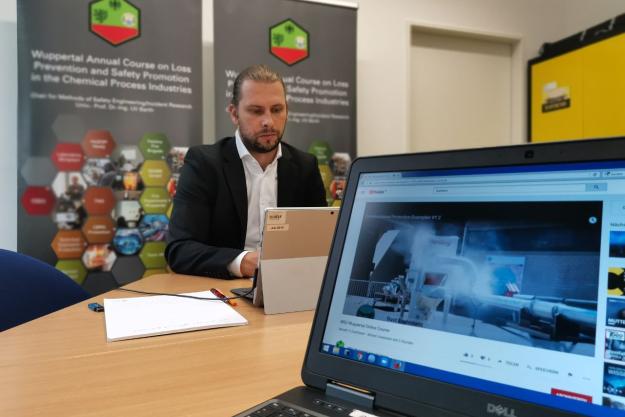
University of Wuppertal’s Project Director, Dr Alexey Leksin explains explosion protection measures in chemical industry.
THE HAGUE, Netherlands—30 September 2020—The University of Wuppertal (UW) in Germany, in partnership with the Organisation for the Prohibition of Chemical Weapons (OPCW), held an online course on Explosion Protection and Error Management from 7 to 30 September 2020. The course included e-learning and live sessions with experts from UW and benefited 24 participants from OPCW Member States in Africa, Asia, as well as Latin America and the Caribbean. A wide range of stakeholders participated including representatives from governments, National Authorities, chemical industry, and academia.
During the opening session, Deputy Permanent Representative of the Federal Republic of Germany to the OPCW, Ms Bianca Müller, stressed the importance of building the capacity of all OPCW Member States to ensure full implementation of the Chemical Weapons Convention (CWC). The Head of Division for Disarmament of Chemical and Biological Weapons of the German Federal Foreign Office, Mr Thomas Göbel, added: “We encourage participants to become ambassadors for chemical safety in their countries and regions.”
OPCW’s Programme Officer in the International Cooperation Branch, Ms Scarlett Ihlau, noted: “For the past 11 years, the OPCW has enjoyed an important and highly productive partnership in this area with the German Federal Foreign Office and the University of Wuppertal. This collaboration has been instrumental in strengthening international cooperation in the field of chemistry. It has also supported the economic and technological development of OPCW Member States, as enshrined in Article XI of the CWC.”
The course was developed by UW under the leadership of Project Director, Dr Alexey Leksin, and the Head of Methods of Safety Engineering and Incident Research, Professor Uli Barth, and included five interactive sessions covering topics such as: explosion basics, assessment of explosion risks, safety characteristics of substances (gases, liquids and dusts), hazardous areas classification, and explosion protection measures. During the practical section, a miniature model of a chemical reactor – the ‘Wuppertal mini-plant’ –– was used during interactive assignments.
Participants also attended two live online seminars developed by UW and Human Factors Research and Training, a research institute from Ludwigsburg, Germany. The sessions covered individual-level and organisational aspects of error and error management.
The participants represented the following OPCW Member States: Burkina Faso, Burundi, Cameroon, Chile, Colombia, Costa Rica, Cuba, El Salvador, Gambia, Saint Vincent and the Grenadines, Indonesia, Iran, Iraq, Kenya, Morocco, Namibia, Nigeria, Pakistan, Saudi Arabia, Senegal, Sri Lanka, Uganda, and Zimbabwe.
Background
As the implementing body for the Chemical Weapons Convention, the OPCW, with its 193 Member States, oversees the global endeavour to permanently eliminate chemical weapons. Since the Convention’s entry into force in 1997, it is the most successful disarmament treaty eliminating an entire class of weapons of mass destruction.
Over 98% of all declared chemical weapon stockpiles have been destroyed under OPCW verification. For its extensive efforts in eliminating chemical weapons, the OPCW received the 2013 Nobel Peace Prize.
